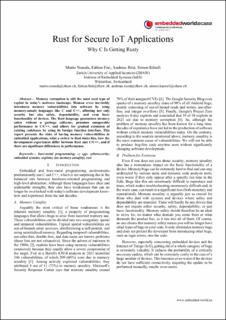Bitte benutzen Sie diese Kennung, um auf die Ressource zu verweisen:
https://doi.org/10.21256/zhaw-25046| Publikationstyp: | Konferenz: Paper |
| Art der Begutachtung: | Peer review (Abstract) |
| Titel: | Rust for secure IoT applications : why C is getting rusty |
| Autor/-in: | Noseda, Mario Frei, Fabian Rüst, Andreas Künzli, Simon |
| et. al: | No |
| DOI: | 10.21256/zhaw-25046 |
| Angaben zur Konferenz: | Embedded World Conference, Nuremberg, Germany, 21-23 June 2022 |
| Erscheinungsdatum: | Jun-2022 |
| Verlag / Hrsg. Institution: | WEKA |
| Sprache: | Englisch |
| Schlagwörter: | Bare-metal programming; C; CPP; Cybersecurity; Embedded system; Exploit; IoT; Memory unsafety; Rust |
| Fachgebiet (DDC): | 005: Computerprogrammierung, Programme und Daten |
| Zusammenfassung: | Memory corruption is still the most used type of exploit in today’s malware landscape. Human error inevitably introduces memory vulnerabilities into software by using memory-unsafe languages like C and C++, affecting not only security but also safety, dependability, and even basic functionality of devices. The Rust language guarantees memory safety without a garbage collector, promises comparable performance to C/C++, and allows for gradual extension of existing codebases by using its foreign function interface. This report presents the risks of having memory vulnerabilities in embedded applications, what a switch to Rust looks like, how the development experiences differ between Rust and C/C++, and if there are significant differences in performance. |
| URI: | https://digitalcollection.zhaw.ch/handle/11475/25046 |
| Volltext Version: | Publizierte Version |
| Lizenz (gemäss Verlagsvertrag): | Lizenz gemäss Verlagsvertrag |
| Departement: | School of Engineering |
| Organisationseinheit: | Institute of Embedded Systems (InES) |
| Enthalten in den Sammlungen: | Publikationen School of Engineering |
Dateien zu dieser Ressource:
| Datei | Beschreibung | Größe | Format | |
|---|---|---|---|---|
| 2022_Noseda-etal_Rust-for-secure-IoT-applications.pdf | 454.63 kB | Adobe PDF |  Öffnen/Anzeigen |
Zur Langanzeige
Noseda, M., Frei, F., Rüst, A., & Künzli, S. (2022, June). Rust for secure IoT applications : why C is getting rusty. Embedded World Conference, Nuremberg, Germany, 21-23 June 2022. https://doi.org/10.21256/zhaw-25046
Noseda, M. et al. (2022) ‘Rust for secure IoT applications : why C is getting rusty’, in Embedded World Conference, Nuremberg, Germany, 21-23 June 2022. WEKA. Available at: https://doi.org/10.21256/zhaw-25046.
M. Noseda, F. Frei, A. Rüst, and S. Künzli, “Rust for secure IoT applications : why C is getting rusty,” in Embedded World Conference, Nuremberg, Germany, 21-23 June 2022, Jun. 2022. doi: 10.21256/zhaw-25046.
NOSEDA, Mario, Fabian FREI, Andreas RÜST und Simon KÜNZLI, 2022. Rust for secure IoT applications : why C is getting rusty. In: Embedded World Conference, Nuremberg, Germany, 21-23 June 2022. Conference paper. WEKA. Juni 2022
Noseda, Mario, Fabian Frei, Andreas Rüst, and Simon Künzli. 2022. “Rust for Secure IoT Applications : Why C Is Getting Rusty.” Conference paper. In Embedded World Conference, Nuremberg, Germany, 21-23 June 2022. WEKA. https://doi.org/10.21256/zhaw-25046.
Noseda, Mario, et al. “Rust for Secure IoT Applications : Why C Is Getting Rusty.” Embedded World Conference, Nuremberg, Germany, 21-23 June 2022, WEKA, 2022, https://doi.org/10.21256/zhaw-25046.
Alle Ressourcen in diesem Repository sind urheberrechtlich geschützt, soweit nicht anderweitig angezeigt.